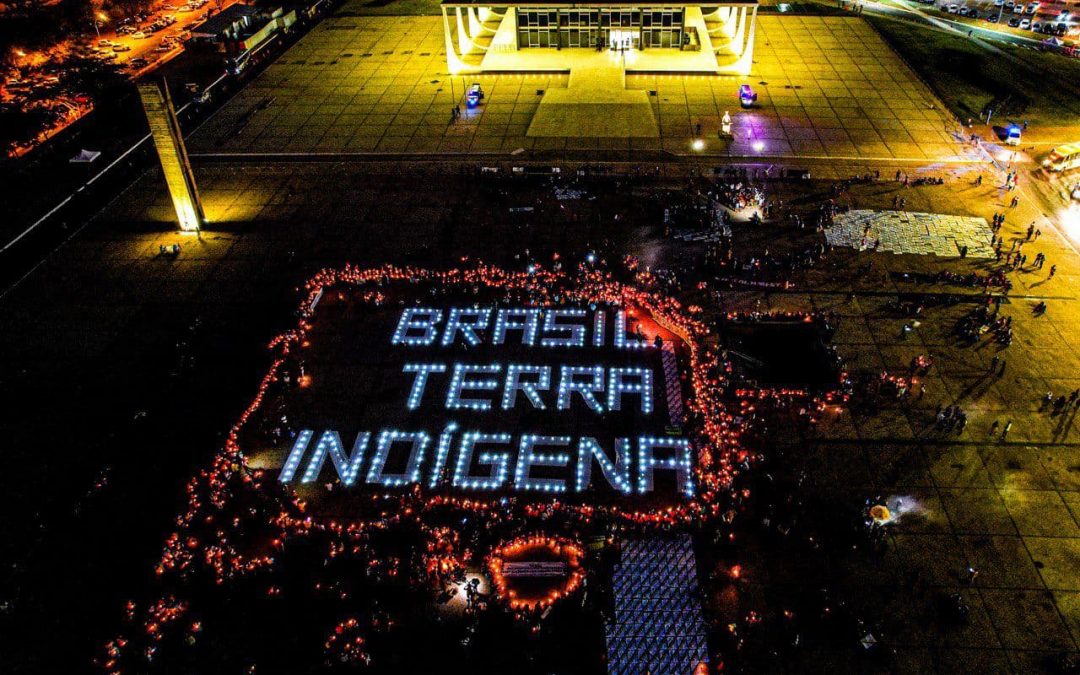Photo: Scarlett Rocha
More than 6,000 indigenous people came to Brasilia at one of the most serious moments ever experienced by indigenous peoples, to demand respect and a guarantee of their rights.
For 521 years, we, the Indigenous Peoples of Brazil, have lived and experienced the meaning of struggle. We struggle to survive, to be respected by a State that despises our existence, usurps our traditional territories, and relegates us to a condition of sub-citizenship. The legacy of the colonial past is persistent and violent, and today it gains support and new impetus under the management of Jair Bolsonaro, the president of the Republic who elected us as priority enemies even before his inauguration.
The history of the indigenous movement in Brazil is a history of struggle and resistance, constant mobilization and innovation, and the search for the construction of bridges and alliances between our 305 peoples, who live in all regions of the country. Such ethnic, geographic, cultural, and linguistic diversity, besides being an inestimable richness, also becomes a challenge when one seeks unity in the struggle. To overcome this difficulty, which is reinforced and exploited by enemies who artificially try to divide and forge disputes and oppositions among our relatives, we renew our alliance from our shared ancestry.
The struggle for life, the motto of the camp that now gathers 6.000 indigenous people in Brasilia, is established as a necessity and an urgency for us, original people, as soon as the perverse and genocidal face of the colonialist project was revealed. We have lived in a state of alert since the first European foot stepped on this land, even before it was named Brazil.
It is symptomatic that after five centuries of colonization, we still have to cry out in defense of our lives, as much as our ancestors had to do in the past. The struggle is still the same, but throughout all these years we have accumulated survival technologies and articulation strategies.
We have learned since the time of our ancestors and from our elders that when the enemy tries to subdue us by force and hatred, the most powerful way to confront the aggressions is to unite. This is what the indigenous movement did in the constituent process of 1988, with the participation of leaders of diverse peoples in the construction of an agenda of rights affirmation. We managed to include part of our demands in the text of the Federal Constitution, which gave us an unprecedented institutional support to advance in the struggle for public policies that would contemplate our specific needs and especially guarantee the demarcation of our indigenous lands.
This, however, was not enough to convince the Brazilian State and a nation – that has not yet pulled out the deepest roots of racism from its culture – that fully respecting us as citizens is not a favor – it is an obligation. Both the Federal Constitution and international treaties to which Brazil is a signatory are categorical in affirming the State’s obligation to demarcate indigenous territories and protect our physical integrity.
Faced with this unending need to reaffirm that our lives matter, when we hold a national mobilization with a historic number of participants, in the midst of the most serious pandemic that the world has faced in centuries, there are two conclusions that run deepest in our hearts.
The first is that the situation is still unfavorable and urgent, and this is one of the factors that brings us massively to Brasilia. Our people can no longer bear to tell stories of death, of fire, of pain, of destruction. We want to tell other stories, we want to talk about our wealth, our cultures, our joy.
And this brings us to the second conclusion: the clear perception that the indigenous movement in Brazil has reached a level of maturity, organicity, and strength that places us definitely as subjects of our own history. Our protagonism is based on centuries of struggle by our ancestors, and on the clarity that there is no more room for silencing. The world is seeing and hearing what is happening to our peoples, and it is we, relatives, who are in control of our narrative!
The record of relatives and numbers of peoples mobilized in Brasilia becomes, therefore, a message to the world, and especially to those forces that insist on trying to violate us: we will not be silenced! Our strength is greater than ever! We are 6 thousands in Brasilia, and we represent all the relatives that continue the struggle in our territories. We are 6 thousands who represent the millions of ancestors who have been erased from history. We are 6 thousands who represent the future of the indigenous peoples of Brazil!

